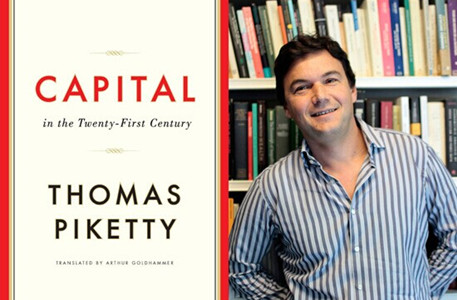Thomas Piketty: Solution to inequality varies in different countries

Thomas Piketty and his book Capital in the Twenty-First Century
Thomas Piketty, a professor from the Paris School of Economics and author of a recent bestseller Capital in the Twenty-First Century, joined a seminar on “Wealth Inequality and Our Future” at Tsinghua University on Nov. 14.
Piketty said that he pieced together hundreds of years of disparate economic data to come to the conclusion that capitalist economies inevitably lead to a system of persistent severe income inequality under which nearly all wealth is inherited.
In his book, Piketty suggested that enhancing capital regulation, financial transparency, tax reform and educational investment can help to ease wealth and income inequality.
He compared the weight of public assets in the economy in
In particular,
But Chinese scholars said what Piketty suggested should be considered within the context of
Piketty added that it is almost impossible to predict a rise in inequality because there is uncertainty with regard to factors, such as technological transformation, development of the education system and the rate of return on capital.
Although Piketty used similar metrics to compare countries, he said no story is the same.
“Each country has a very complex reason of inequality,” he said. “All I’m trying to provide is a reminder of a larger historical perspective on inequality and taxation.”
Piketty said the rate of return on capital invariably exceeds the rate of economic growth, meaning that those who receive income from capital generally outpace wage earners and others who rely on the growth of the overall economy, hence inequality occurs.
Improving education is the best option to solve wealth and income inequality in the long run, he said, which is why everyone, not just elites, needs access to high-quality education.
The Chinese version appeared in Chinese Social Sciences Today, No. 672, Nov.21, 2014
The Chinese link is: http://www.cssn.cn/zx/bwyc/201411/t20141122_1411269.shtml
Translated by Yang Xue
Revised by Justin Ward
